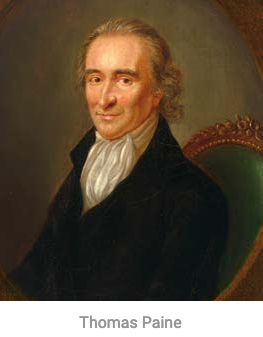It took some time to convince people in the English colonies to seek independence from their king and Parliament. Even as late as the end of 1775, General Washington and his officers were drinking toasts to King George III. But by the spring of 1776, attitudes were changing—and one of the things that helped them change was a small book by a relatively new English immigrant to America. A man named Thomas Paine.
 Paine’s book, Common Sense, is an eloquent summary of Liberal social contract theory. Governments, says Common Sense, are necessary only to protect individual freedom and security. But while other Liberal thinkers argued for aristocracies and monarchies, such governments for Paine were nothing but tyrannies. The only just form of government, he said, is a republican government of officials elected by the people. As for the king of Great Britain—he, said Paine, only used the colonies for his own benefit. Moreover, America had come of age and thus no longer needed to be ruled by the “Royal Brute of Great Britain.” In America, said Paine, not George III, but the law should be king.
Paine’s book, Common Sense, is an eloquent summary of Liberal social contract theory. Governments, says Common Sense, are necessary only to protect individual freedom and security. But while other Liberal thinkers argued for aristocracies and monarchies, such governments for Paine were nothing but tyrannies. The only just form of government, he said, is a republican government of officials elected by the people. As for the king of Great Britain—he, said Paine, only used the colonies for his own benefit. Moreover, America had come of age and thus no longer needed to be ruled by the “Royal Brute of Great Britain.” In America, said Paine, not George III, but the law should be king.
Though Common Sense convinced many colonists, including George Washington, of the necessity of independence, many others, including some members of the Continental Congress, remained opposed. But despite the opposition, between mid-May and early June 1776, all the southern and New England colonies endorsed independence…. read more>>
RELATED RESOURCES:
- Common Sense, by Thomas Payne




You must be logged in to post a comment.